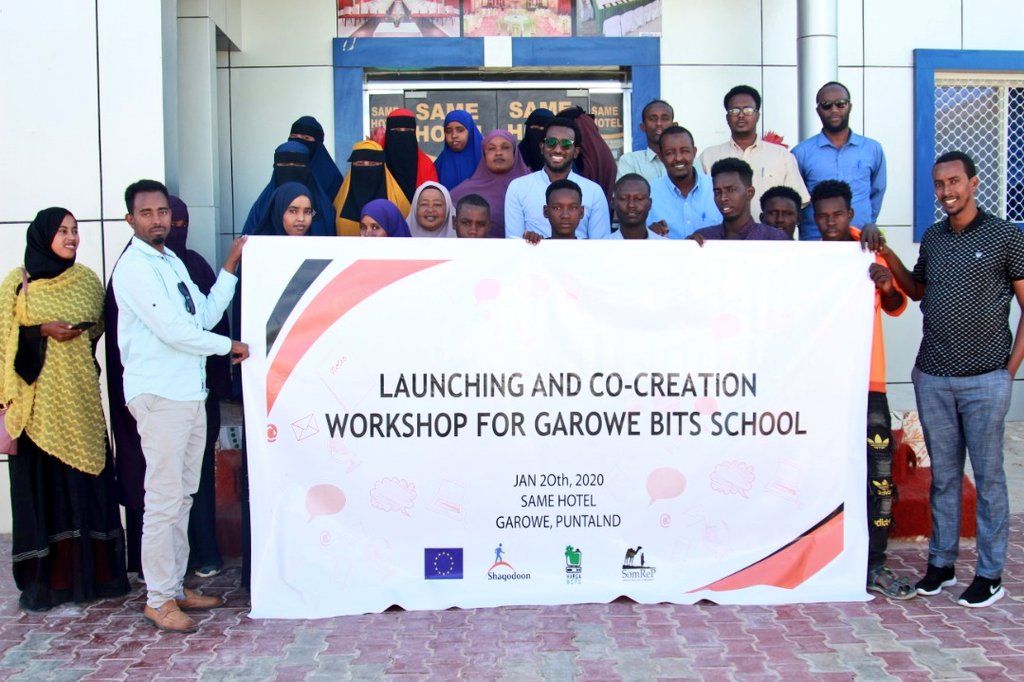More than 200 local young men and women have graduated from digital skills courses, in particular, graphic design and web design at GaroBits School, managed by Shaqadoon Organization in Garowe, Puntland State, Somalia. The courses were funded by donor countries such as the EU and the US, and implemented by the Shaqodoon Organization, which is a local non-profit organisation established in 2011 to help young people get job opportunities through training and skills to improve their prospects in life. The organisation’s headquarters are in Hargaisa, Somaliland.
Somaliland declared its breakaway from Somalia in 1991 and has been acting as a separate state ever since. But, Somaliland is not yet recognized by any country as an independent country.
To come back to the point, one of the courses was the digital skills training, which started in early 2021 in Garowe City, the state capital of Puntland State, Somalia. But the digital skills training was abruptly ended at the end of 2022 and has not resumed since.
The hope was that this program would continue and expand to other cities in Puntland rather than end like that. The reason is not yet clear, but there was a conflict that erupted in Lasanod City in February 2023 between local tribal forces and Somaliland forces that have been controlling the city since 2008.
The backdrop of the conflict was accusations of killings that took place in the city against many prominent local leaders since Somaliland forces came to the city in 2008. Also, the city and the area were disputed between Somaliland and the Puntland state of Somalia as to who controlled them.
In that context, the digital skills course stopped, and some local staff of the Shaqodoon Organization in Garowe suspected that those in Hargaisa decided to play tribal politics with this and cancelled the continuation of the courses.
The young people who graduated from the graphic design courses found jobs in local businesses, and some of them became self-employed using their graphic design skills to help businesses use social media to reach many customers, for example.
I have attended several graduations of those 200 students during the two years the course was taking place, and I could see the impact the course had on those young people, who mainly came from disadvantaged families in small towns in Puntland and had the prospect of getting employment through the graphic design in particular they had learned. Each cohort was comprised of about 50 to 60 students, and they were given laptop computers on graduation day to help them get employed and continue their educational journey in the digital skills field.
This was exciting for me, because it was the only free comprehensive digital skills course that was taking place in the entire Puntland state of Somalia, and I was advising the local Shaqodoon staff and managers to expand this course to other Puntland cities, not knowing that everything was subject to local tribal disputes and clan-based Somali politics.
Having seen the way young people waste many hours of their time on their small screen phones, such digital skills are massive for the young people in places like Somalia to steer them to a brighter future of employment and understand the good side of digital technology. But when this project is subject to a lack of funding, and in this case, tribal affiliations, the prospect of sustainable development of the young people’s skills is in jeopardy.
I wish the Shaqodoon Organization and those who lead it overcame the backward tribal affiliations and clan-based politics that plagued the entire Horn of Africa, and in particular Somalia, to never politicize such a noble cause in the future.
I call on donor countries and organisations to be vigilant about the tribal tendencies that exist in Somali society and to increase funding for these digital skills projects in Puntland and other parts of Somalia in order to a degree reduce the gap between digital haves and have-nots.
Another important consideration related to any new donor project in Somalia is the wide spread of corruption that exists from the top leadership down to the lower-level officials. It is not a secret that government officials, whether local or national, would try to place their next of kin in any potential vacant educational or employment opportunity. Hence, all the necessary steps should be taken to make sure that people intended to benefit from such projects are benefiting from them.
Long way, it seems still to go in Somalia in particular, but projects related to digital skills for young people in Somalia should be encouraged, funded, and expanded to all major cities in Somalia.
Siyad A. Yusuf
